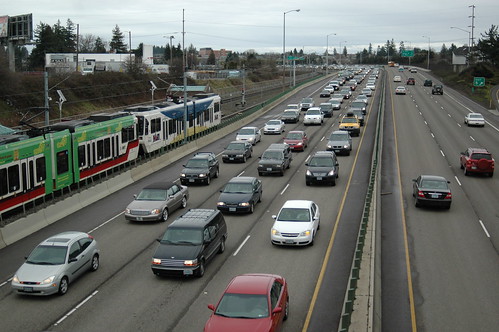
Do we need all this traffic to keep our economy afloat?
Are lots of cars essential to the economy? It is a common assumption that they are, and this is one reason that huge subsidies for cars, roads, and fuel persist through tough economic times and ferocious advocacy for reduced government spending.
New research out of Oregon-based transportation research institute OTREC, however, suggests that this assumption is not true. OTREC released today a study conducted by researcher B. Starr McMullen, who studied the economic ups and downs in several cities, including Portland.
McMullen found that while economic growth often leads to more driving, the reverse does not happen — when people drive less, it does not hurt the economy. Here’s an excerpt from OTREC’s press release:
McMullen found that, in medium-sized or larger urban areas, there was no significant causal relationship between driving and economic activity in either direction. A few urban areas, including Portland, showed a two-way causal relationship between driving and economic growth.
However, when she controlled for factors that vary across urban areas—such as availability of transit, gas prices, population density, employment mix and the miles of road— this causal relationship was no longer observed in the Portland area. This demonstrates the need to look more closely at other factors that influence VMT and driving in each metropolitan area before trying to figure out the potential effects of VMT reduction policies.
We already know many ways that that reducing our reliance on cars helps local economies by keeping money circulating locally, supporting small, local businesses, promoting tourism, and huge savings on public and private infrastructure and health care costs, among other benefits that I could go on about (and have at length — online and in print).
This study shows that the resulting reduction in driving does not do more harm than all the good done by using other means. It’s a relief to hear–though it’s also important to keep in mind that we can’t correct decades of transportation policy mistakes overnight. As McMullen points out, no benefits are to be gained from discouraging driving when alternatives simply don’t exist. We definitely have our work cut out for us.